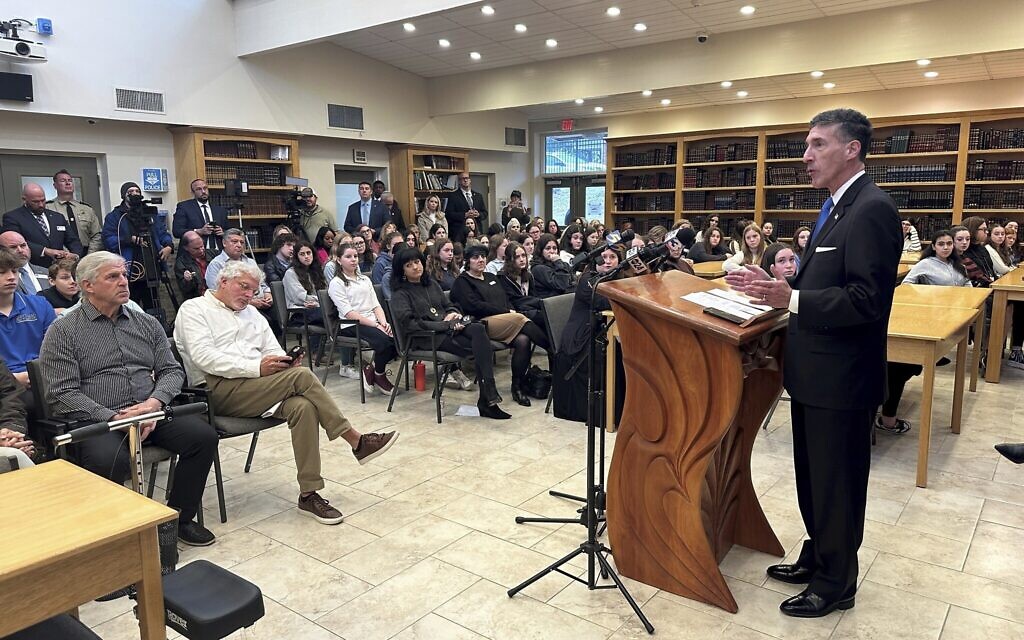RSS
Tennessee lawmakers discuss safety, Israel support at Jewish school that foiled gunman

Gov. Bill Lee and Rep. David Kustoff visit Memphis school attacked by former student, note growing importance of security measures amid Israel’s war with Hamas terror group
The post Tennessee lawmakers discuss safety, Israel support at Jewish school that foiled gunman appeared first on The Times of Israel.
RSS
Twitter AI’s Spree of Antisemitic Answers Provokes European Union Meeting as US Military Signs Deal With Company

European Union flags flutter outside the EU Commission headquarters in Brussels, Belgium, on June 17, 2022. Photo: Reuters/Yves Herman
Following an update earlier this month to xAI’s Grok chatbot which resulted in a wave of antisemitic and pro-Hitler responses to users on X/Twitter, the European Commission summoned representatives from billionaire Elon Musk’s artificial intelligence company to a Tuesday meeting to explain themselves.
The move comes after Italian parliament member Sandro Gozi urged for the Commission to begin a formal inquiry, as “the case raises serious concerns about compliance with the Digital Services Act (DSA) as well as the governance of generative AI in the Union’s digital space.”
Poland’s Minister of Digital Affairs Krzysztof Gawkowski had also called for the Commission to take action and said that the Polish government would consider banning the app.
Due to the size of the X platform, the site falls under the European Union’s DSA which requires transparency about operations. Musk’s app already faces multiple investigations by the Commission.
On Wednesday, following the initial antisemitic statements from Grok, X’s Linda Yaccarino, the company’s CEO, announced her resignation.
On Monday, xAI announced a $200 million deal to provide Grok to the US military. The company stated that “under the umbrella of Grok For Government, we will be bringing all of our world-class AI tools to federal, local, state, and national security customers.” Customers in the plan could “use the Grok family of products to accelerate America – from making everyday government services faster and more efficient to using AI to address unsolved problems in fundamental science and technology.”
The Pentagon also announced on Monday other AI companies would receive contracts, including Anthropic, Google and OpenAI.
Douglas Matty, chief digital and AI officer at the Defense Department, said that “leveraging commercially available solutions into an integrated capabilities approach will accelerate the use of advanced AI as part of our Joint mission essential tasks in our warfighting domain as well as intelligence, business, and enterprise information systems.”
Also on Monday, Musk unveiled a new release to the AI capabilities on X. The Companions feature will allow users to interact with cartoon characters, including a mischievous fox and an anime-style goth girl named Ani.
On Tuesday, xAI put out a statement explaining that it had “spotted a couple of issues with Grok 4 recently that we immediately investigated & mitigated.” The company said it had “tweaked the prompts and have shared the details on GitHub for transparency. We are actively monitoring and will implement further adjustments as needed.”
The post Twitter AI’s Spree of Antisemitic Answers Provokes European Union Meeting as US Military Signs Deal With Company first appeared on Algemeiner.com.
RSS
Jewish Synagogue, Holocaust Memorial Vandalized in Poland After Politician Denies Holocaust

An antisemitic slur spray-painted on the ruins of a former synagogue in Dukla, Poland. Photo: World Jewish Restitution Organization
Two Jewish sites in Dukla, Poland, were vandalized over the weekend mere days after Polish member of the European Parliament (MEP) Grzegorz Braun claimed gas chambers at the former Auschwitz-Birkenau concentration camp were fake and repeated an antisemitic blood libel in a live radio interview.
Vandals spray-painted the word “F–k” followed by a Star of David on the ruins of a former synagogue that was destroyed by the Nazis during the Holocaust, and a memorial commemorating Holocaust victims located at the entrance of the Jewish cemetery in Dukla was defaced with a swastika and the word “Palestine,” according to the World Jewish Restitution Organization (WJRO). The memorial honors Jews of Dukla and the surrounding areas who were murdered by Nazis during the Holocaust.
The two Jewish sites in Dukla are cared for by the Foundation for the Preservation of Jewish Heritage in Poland (FODZ), which was established in 2002 by the Union of Jewish Communities in Poland and the WJRO to protect and commemorate Poland’s Jewish heritage sites.
“These hateful acts are not only antisemitic, but they are also attempts to erase Jewish history and desecrate memory,” said WJRO President Gideon Taylor in a released statement on Tuesday. “Polish authorities must take swift and serious action to identify the perpetrators and ensure the protection of Jewish heritage sites in Dukla and across the country.”
“The vandalism of Jewish sites in Dukla—with swastikas and anti-Israel slurs—is not an isolated act,” insisted Jack Simony, director general of the Auschwitz Jewish Center Foundation (AJCF), in a statement to The Algemeiner. The nonprofit focuses on preserving the memory of the Jewish community in Oświęcim (Auschwitz) and maintains the Auschwitz Jewish Center, the last remaining synagogue in town.
“While we cannot say definitively that it [the vandalism] was sparked by Grzegorz Braun’s Holocaust denial, his rhetoric contributes to an atmosphere where hatred is emboldened and truth is under assault,” added Simony. “Braun’s lies are not harmless — they are dangerous. Holocaust denial fuels antisemitism and, too often, violence. This is why Holocaust education matters … because when we fail to confront lies, we invite their consequences. Memory must be defended, not only for the sake of the past, but for the safety of our future.”
On July 10, a ceremony was held commemorating the 84th anniversary of the 1941 Jedwabne massacre, when hundreds of Polish Jews were massacred – mostly by their neighbors – in the northeastern town in German-occupied Poland. The ceremony was attended by dignitaries and faith leaders including Poland’s Chief Rabbi Michael Schudrich and Israeli Deputy Ambassador Bosmat Baruch. Groups of anti-Israel and far-right activists — including MEP Braun and his supporters – tried to disrupt the event by holding banners with antisemitic slogans and blocking the vehicles of the attendees, according to Polish radio.
Hours later, during a live radio broadcast, Braun falsely claimed the Auschwitz gas chambers were “a lie” and the Auschwitz-Birkenau Memorial and Museum was promoting “pseudo-history.” He also claimed that Jewish “ritual murder is a fact.” Polish prosecutors launched an investigation into Braun’s comments, they announced that same day. Under Article 55 of the Act on the Institute of National Remembrance (IPN), Holocaust denial is a criminal offense in Poland.
The Auschwitz-Birkenau Memorial and Museum issued a swift condemnation of Braun’s remarks and said it intents to pursue legal action. The Institute of National Remembrance — which is the largest research, educational and archival institution in Poland – also denounced Braun’s remarks, saying there is “well-documented” evidence supporting the existence of gas chambers. His comments were also condemned by the Embassy of Israel in Poland, Polish Foreign Minister Radosław Sikorski and the US Embassy in Warsaw, which said that his actions “distort history, desecrate memory, or spread antisemitism.” AJCF called on the European Parliament to consider disciplinary measures against Braun, including potential censure or expulsion.
Auschwitz Jewish Center Director Tomek Kuncewicz said Braun’s comments are “an act of violence against truth, against survivors, and against the legacy of our shared humanity.” AJCF Chairman Simon Bergson called the politician’s remarks “blatant and baseless lies,” while Simony described them as “a calculated act of antisemitic incitement” that “must be met with legal consequences and universal moral condemnation.”
The post Jewish Synagogue, Holocaust Memorial Vandalized in Poland After Politician Denies Holocaust first appeared on Algemeiner.com.
RSS
Coalition of 400 Jewish Orgs and Synagogues Urge Teachers Union to Reverse Decision Cutting Ties with ADL

Anti-Defamation League CEO Jonathan Greenblatt. Photo Credit: ADL.
Following a vote by the National Education Association (NEA) on July 6 to end its relationship with the Anti-Defamation League (ADL), 400 Jewish communal groups, education organizations, and religious institutions have come together to call for the influential teachers union to change course.
“We are writing to express our deep concerns about the growing level of antisemitic activity within teachers’ unions, particularly since the Hamas terrorist attacks in Israel on October 7, 2023,” the letter to NEA President Becky Pringle stated. “Passage of New Business Item (NBI) 39 at the National Education Association (NEA) Representative Assembly this past weekend, which shockingly calls for the boycott of the Anti-Defamation League, is just the latest example of open hostility toward Jewish educators, students and families coming from national and local teachers’ unions and their members.”
In addition to the ADL, signatories of the letter included American Jewish Committee (AJC), Conference of Presidents of Major American Jewish Organizations, Jewish Federations of North America, #EndJewHatred, American Jewish Congress, B’nai B’rith International, CAMERA (Committee for Accuracy in Middle East Reporting & Analysis), Combat Antisemitism Movement, Democratic Majority for Israel, StandWithUs, Simon Wiesenthal Center, Zioness Movement, and Zionist Organization of America (ZOA).
The group told Pringle that “we have heard directly from NEA members who have shared their experiences ranging from explicit and implicit antisemitism within the union to a broader pattern of insensitivity toward legitimate concerns of Jewish members – including at the recently concluded Representative Assembly. We are also deeply troubled by a broader pattern of union activity over the past 20 months that has targeted or alienated Jewish members and the wider Jewish community.”
The letter to Pringle included an addendum providing examples of objectionable rhetoric. These named such incidents as the Oakland Education Association (OEA) putting out a statement calling for “an end to the occupation of Palestine” and the Massachusetts Teachers Association (MTA) accusing Israel of genocide.
The coalition of 400 organizations urged the NEA to “take immediate action” and suggested such steps as rejecting NBI 39, issuing a “strong condemnation” of antisemitism within the union, drafting a plan to counter ongoing antisemitism in affiliate chapters, and opposing “any effort to use an educator’s support for the existence of Israel as a means to attack their identity.”
ADL CEO and National Director Jonathan Greenblatt wrote on X that “Excluding @ADL’s educational resources from schools is not just an attack on our org, but on the entire Jewish community. We urge the @NEAToday Executive Committee to reverse this biased, fringe effort and reaffirm its commitment to supporting all Jewish students and educators.”
The post Coalition of 400 Jewish Orgs and Synagogues Urge Teachers Union to Reverse Decision Cutting Ties with ADL first appeared on Algemeiner.com.
